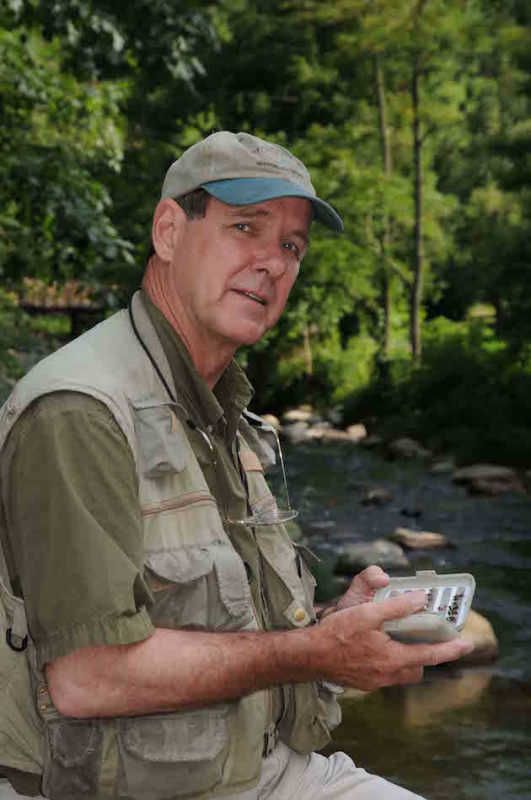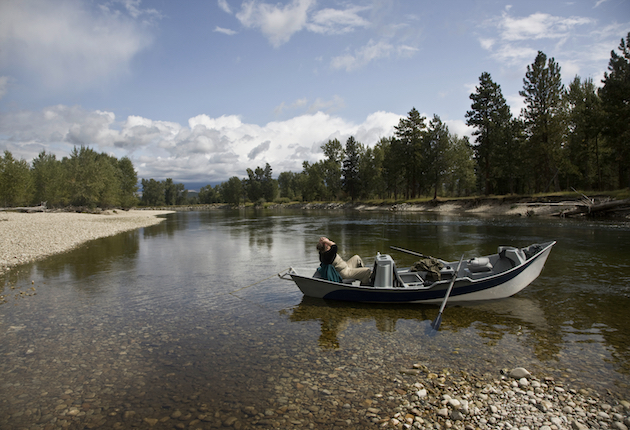Nothing delights the eye of a hot trout angler at high summer than the cold, clear flow of a tailwater. With generators off, the river dances through boulder fields with gentle grace. Picking out fishy pockets and runs is as easy as plucking grapes from a stem. Turn on the generators, and boulder fields boil with adolescent energy. Watch for rises along the bank. In either event, the river’s chill, damp whisper will cool you.
Or so I thought. One recent Saturday, friend Eric and I booked an all-day float on the Watauga River. Famed for its browns and rainbows, the river streams from under the dam by the same name, rushes through tiny Wilbur Lake, and winds 16 miles through the ridges and valleys of northeastern-most Tennessee.
That day, more than 20 middle U.S. states were smothered by a fearsome heat wave. The forecast for our area called for a high of 92° Fahrenheit, with a heat index reaching into the 100s. Only a 20 percent chance of showers was forecast, and those in late afternoon. We told ourselves the heat wouldn’t be a problem. After all, we’d be sitting all day, wearing light clothes, slathering on gobs of sun block, and drinking lots and lots of water. That’s just what we did.
It wasn’t enough. For the whole seven-hour float, the sun had been unrelenting. We’d been too busy catching fish on tiny beadhead midge nymphs and beetles to pay much attention. Addicted to fishing cane, my rod set was too soft for the brown of at least 18 inches that slipped languidly from beneath the trees to take my dry. Didn’t really matter to me. The presentation had been good, the trout did what it was supposed to, and I was getting enjoyably pooped.
Just how tired I had no idea of knowing until the ride back with the guide and my buddy to the outfitter’s shop where we’d left our cars. Every time someone asked me a question, I could not articulate the answer, even though I could say the words in my mind.
On my drive of about 100 miles to get home, I wondered where I put my other pair of glasses. Had I left them at the fly shop? I pulled over to search the car and finally found them sitting on the seat right next to me. As I continued on, the names on the highway signs might as well have been written in Sanskrit as far as I could read them. Only route numbers could I decipher, and they, thank heavens, led me to my garage door.

A photo of the author on a much cooler day.
Other than being a bit disoriented, I was able to stow my tackle easily enough. But when I sat down to drop my friend an email I could not remember his name. The cause, I thought, was “bad meat” in my sandwich, just as Mom had promised all those years ago if I did not refrigerate my lunch.
But it wasn’t that at all, I learned next morning. It was heat exhaustion verging on heat stroke, the number one weather-related killer. According to Andrew Pritchell, senior NOAA meteorologist at Morristown, Tennessee—the closest weather bureau to the Watauga—Saturday’s high had reached 98°, which, with humidity, generated a heat index of about 105°.
“Even a half-hour or an hour in that can trigger heat exhaustion,” he said.
I rolled my eyes at the thought of being on the river all day in the sun. Riding in a drift boat made it worse, like baking in a light-gray casserole.
Like me, most anglers and guides don’t know the symptoms of heat illnesses. A couple hours into the trip, my calves cramped, which I attributed to the awkward position of my elephant-size, wading-boot-clad feet. I was sweating heavily, but my skin did not feel that hot. A small headache lurked over my left ear. Later, after reading Mayo Clinic’s descriptions of heat disease, did I know what ailed me.
It is hard to jump off a river float when such a malady strikes. What to do?
First, prepare. Read up on heat illness, dress in lightweight clothing, wear a floppy hat, and bring a bath towel with you. If you feel any of the symptoms, tell your guide, slop the towel in the river, and spread it over your shoulders. It’ll feel great, and it may save your life. Your shirt will dry.
Remember the standard airline announcement about oxygen masks? Guides should keep cool, then take care of their clients. If a mid-summer float trip will pass beyond cell phone range, guides should carry satellite phones, if they don’t already. Heat stroke demands immediate and skilled attention, and its severity depends on the physical condition of the victim and how he’s treated at its onset.
Threat of heat illness should not put the kibosh on a high-sun float. Instead, stay cool, cast bugs, and hook that lovely, big old brown lookin’ up in the shade.

